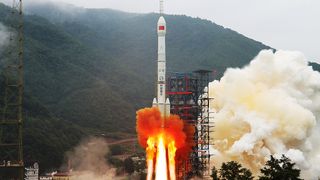
A Chinese Long March 3B rocket during launch.
(Image credit: CASC)
Rocket debris from China’s recent satellite launch fell to ground near inhabited areas, where bystanders caught the fiery touchdown on tape.
The China National Space Administratio launched two satellites into orbit on Monday (Dec. 25) at 10:26 p.m. EST (0326 GMT Dec. 26 or 11:26 a.m. local time in China) from the Xichang Satellite Launch Center in Sichuan province. The Long March 3B rocket carried two satellites for China’s Beidou Navigation Satellite System, which is roughly equivalent to the GPS system used in North America.
While the satellites were successfully delivered into medium Earth orbit (MEO), side boosters of the Long March 3B multistage launch vehicle fell back to Earth and landed in South China’s Guangxi region, SpaceNews.com reported.
Related: China launches BeiDou navigation satellite to orbit (video)
Bystander footage shared on X (formally Twitter) by space journalist Andrew Jones, originally from Weibo, apparently shows one of the boosters falling within a forested area. The video shows an explosion. Reports also emerged of wreckage from the other booster that were said to have landed near a home.
Heads up: it’s been a while, but this kind of falling booster action was a feature of the Long March 3B launches of Beidou satellites from Xichang. https://t.co/rRM0mQ2g0p https://t.co/UnFXaoGgC4 pic.twitter.com/7XkRCTFLaWDecember 26, 2023
See more
“The presence of reddish-brown gas or smoke indicative of nitrogen tetroxide is visible in both, while a yellowish gas, possibly the results of unsymmetrical dimethylhydrazine (UDMH) fuel mixing with air, can be seen next to the building,” according to SpaceNews.com.
“The first stage and four side boosters of the Long March 3B use the hypergolic propellant combination of hydrazine and nitrogen tetroxide. Both the nitrogen tetroxide oxidizer and UDMH fuel present serious health risks.”
This is not the first time rocket boosters associated with Beidou satellite launches have reported to fall near inhabited areas. In 2019, a booster — which provides the necessary thrust for lift-off and then separates from the main stage — fell back to Earth after launch and destroyed a home, according to reports.
China has also been criticized many times for allowing the massive Long March 5 rocket to fall back to Earth naturally, causing space debris, following launches of the heavy-launch system.
China has inland launch sites, compared to coastal launch sites, which allow rocket debris to land in the ocean. Public notices and evacuations are issued ahead of such rocket launches to warn residents of potential risks from rocket debris.
As the 57th and 58th Beidou satellites to be launched, the pair will act as backups and reduce the operational risks to the Beidou-3 system, which consists of satellites in MEO, geostationary Earth orbit (GEO) and inclined geosynchronous orbit (IGSO). This network of satellites ensures continuous and stable signal coverage for China’s global navigation systems.
Join our Space Forums to keep talking space on the latest missions, night sky and more! And if you have a news tip, correction or comment, let us know at: community@space.com.
Breaking space news, the latest updates on rocket launches, skywatching events and more!
Samantha Mathewson joined Space.com as an intern in the summer of 2016. She received a B.A. in Journalism and Environmental Science at the University of New Haven, in Connecticut. Previously, her work has been published in Nature World News. When not writing or reading about science, Samantha enjoys traveling to new places and taking photos! You can follow her on Twitter @Sam_Ashley13.
>>> Read full article>>>
Copyright for syndicated content belongs to the linked Source : Space.com – https://www.space.com/chinese-rocket-booster-space-crash-report
